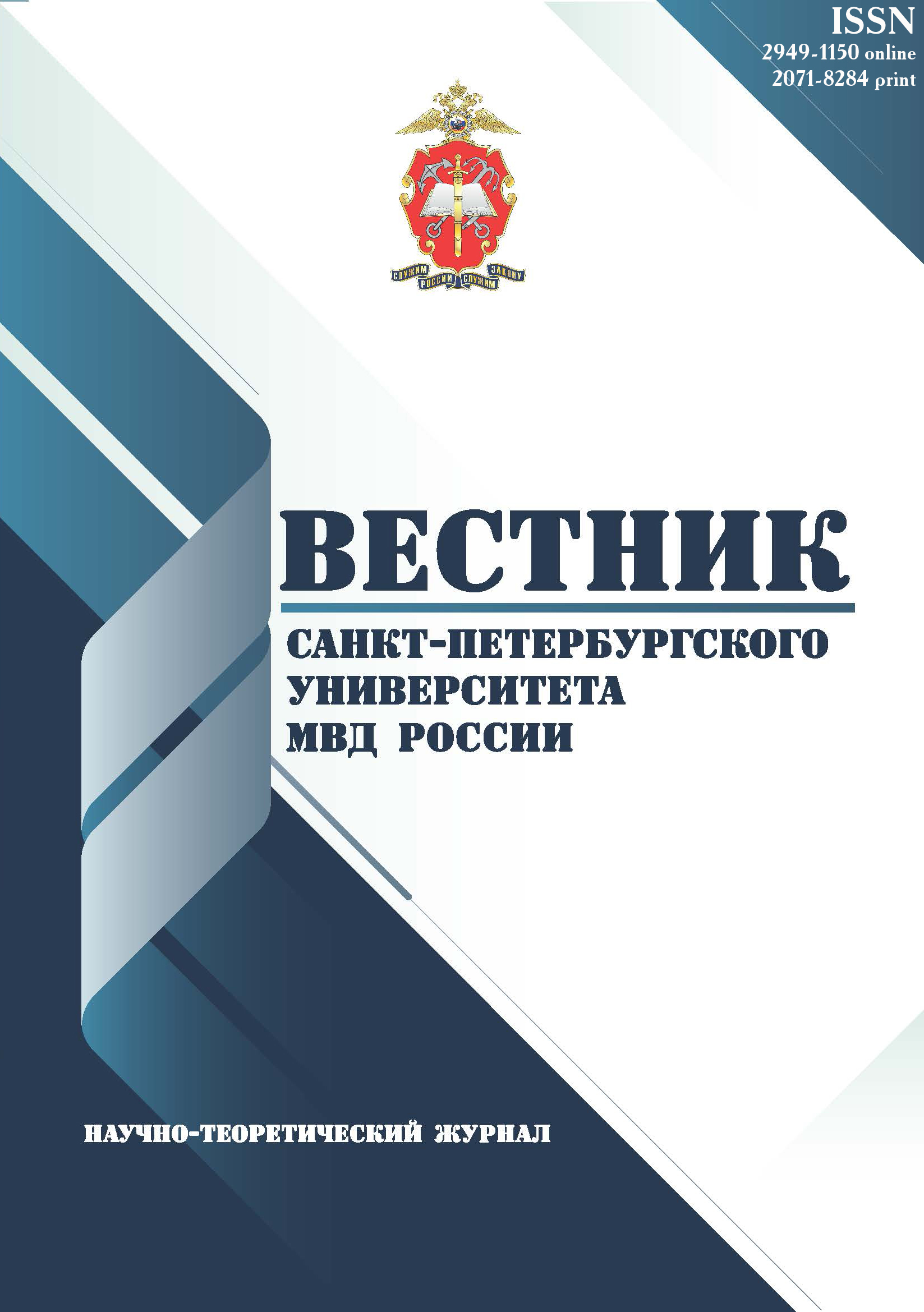from 01.01.2017 until now
Maykop, Maykop, Russian Federation
UDC 796.015.43
Introduction. Police officers in the process of apprehending offenders have to use physical force. The law obliges to take into account the nature and degree of danger of the offender's actions. Nevertheless, at present, the issue of permissible physical impact is insignificantly considered in the literature, while police officers are subject to disciplinary or criminal liability depending on the severity of the consequences. The question arises: how to teach police officers the lawful use of physical force in the conditions of initial training at universities of the Ministry of Internal Affairs of Russia. Methods. Analysis and synthesis were used as the main methods of research for solving the set question, which allowed, on the basis of legal norms, to develop methodological recommendations and exercises for working out the lawful use of physical force and pain techniques. Results. Based on the model of lawful use of physical force developed by S.V. Kuznetsov and A.N. Volkov, we propose exercises to teach the process of detention. This process is divided into stages of interaction between the police officer and the offender: the stage of identification of signs of an offence (crime), the stage of verbal communication, the stage of coercion, the stage of forced use of physical force and pain techniques, the stage of restriction of mobility. The stage of forced use of physical force and pain techniques provides for different strength of resistance of the offender: ‘Ignore’, ‘Lazy offender’, ‘Energetic offender’, ‘Offensive offender’, ‘Aggressive offender’, ‘Dangerous offender’. Depending on the strength of the resistance, the officer uses permissible physical force or physical force with painful techniques.
physical force, painful techniques, lawful application
1. Volkov A. N., Kuznecov S. V. Praktika primeneniya sotrudnikami policii sily // Yuridicheskaya nauka i praktika: Vestnik Nizhegorodskoy akademii MVD Rossii. 2018. № 3 (43). S. 133–140. https://doi.org/10.24411/2078-5356-2018-10319.
2. Kursaev A. V. Grani pravomernogo i ugolovno-nakazuemogo primeneniya sotrudnikami policii fizicheskoy sily, special'nyh sredstv i ognestrel'nogo oruzhiya (po materialam sudebnoy praktiki) // Aktual'nye problemy gosudarstva i prava. 2022. T. 6, № 3. S. 349–361. https://doi.org/10.20310/2587-9340-2022-6-3-349-361.
3. Kaznacheev V. A. Praktiko-pravovye osobennosti primeneniya sotrudnikami silovyh struktur fizicheskoy sily // Izvestiya Samarskogo nauchnogo centra Rossiyskoy akademii nauk. Social'nye, gumanitarnye, mediko-biologicheskie nauki. 2021. T. 23, № 80. S. 23–28. https://doi.org/10.37313/2413-9645-2021-23-80-23-28.
4. Voronov A. I., Chigoryaev E. A., Krest'yaninov V. A. Prinyatie resheniya sotrudnikom policii po primeneniyu sredstv prinuzhdeniya // Psihopedagogika v pravoohranitel'nyh organah. 2019. T. 24, № 4 (79). S. 410–416. https://doi.org/10.24411/1999-6241-2019-14009.
5. Gavrilov D. A., Patrusheva A. Yu., Bayasgalan B. E. Nekotorye aspekty pravomernogo primeneniya sotrudnikami policii fizicheskoy sily, special'nyh sredstv i ognestrel'nogo oruzhiya / Sovershenstvovanie professional'noy i fizicheskoy podgotovki kursantov, slushateley obrazovatel'nyh organizaciy i sotrudnikov silovyh vedomstv : materialy XVIII Mezhdunarodnoy nauchno-prakticheskoy konferencii, Irkutsk, 16–17 iyunya 2016 : v 2 t. Irkutsk : Vostochno-Sibirskiy institut MVD RF, 2016. T. 1. S. 59–65.
6. Shatilovich S. N., Morozov V. I. Voprosy pravovoy reglamentacii primeneniya sotrudnikami ohranno-konvoynyh podrazdeleniy policii fizicheskoy sily, special'nyh sredstv i ognestrel'nogo oruzhiya v sostoyanii neobhodimoy oborony v sluchae prichineniya napadavshemu licu vreda zdorov'yu libo smerti // Yuridicheskaya nauka i pravoohranitel'naya praktika. 2021. № 1 (55). S. 60–70.
7. Basistov D. G., Ishbulatova A. R. Pravomernoe primenenie fizicheskoy sily sotrudnikami policii / Sovershenstvovanie fizicheskoy podgotovki sotrudnikov pravoohranitel'nyh organov : sbornik statey. Orel : Orlovskiy yuridicheskiy institut MVD Rossii imeni V. V. Luk'yanova, 2017. S. 52–55.
8. Barkalov S. N. Nekotorye osobennosti modelirovaniya situaciy ogranicheniya svobody peredvizheniya assistenta v hode zanyatiy po fizicheskoy podgotovke s sotrudnikami policii Rossii // Nauka-2020. 2020. № 5 (41). S. 77–83.
9. Kuznecov S. V., Volkov A. N. Model' pravomernogo primeneniya fizicheskoy sily // Yuridicheskaya nauka i praktika: Vestnik Nizhegorodskoy akademii MVD Rossii. 2021. № 2 (54). S. 72–78. https://doi.org/10.36511/2078-5356-2021-2-72-78.
10. Cekunov S. O., Krysin M. V., Znamenskiy I. Yu. Pravovye aspekty primeneniya fizicheskoy sily i boevyh priemov bor'by sotrudnikami policii / Aktual'nye voprosy sovershenstvovaniya taktiko-special'noy, ognevoy i professional'no-prikladnoy fizicheskoy podgotovki v sovremennom kontekste prakticheskogo obucheniya sotrudnikov organov vnutrennih del : materialy mezhdunarodnoy nauchno-prakticheskoy konferencii, g. Sankt-Peterburg, 30 noyabrya 2020 g. Sankt-Peterburg : Sankt-Peterburgskiy universitet MVD Rossii. S. 431–434.
11. Volosnikov I. V. Ispol'zovanie delovoy igry dlya obucheniya sotrudnikov policii pravomernomu primeneniyu fizicheskoy sily // Novaya nauka: ot idei k rezul'tatu. 2017. T. 1, № 2-1. S. 12–14.
12. Iogolevich N. I., Iogolevich V. A., Ivanova S. I. Razvitie sistemy ocenki professional'nyh kompetenciy sotrudnikov pravoohranitel'nyh organov // Psihopedagogika v pravoohranitel'nyh organah. 2018. № 1 (72). S. 60–67.
13. Pastuhov E. V. Obuchenie pravomernomu primeneniyu boevyh priemov bor'by // Problemy i perspektivy razvitiya obrazovaniya v Rossii. 2014. № 31. S. 144–147.
14. Pryahin A. S. Specifika obucheniya boevym priemam bor'by sotrudnikov OVD, prohodyaschih pervonachal'nuyu podgotovku // Teoriya i praktika obschestvennogo razvitiya. 2015. № 5. S. 83–86.
15. Kuschev P. M., Nahodkin E. N., Golovinskiy I. V., Chernousov M. V. Gotovnost' k silovomu zaderzhaniyu pravonarushitelya: istoricheskiy opyt i sovremennye trebovaniya k podgotovke sotrudnika policii // Yurist'-Pravoved'. 2015. № 6. S. 103–108.













